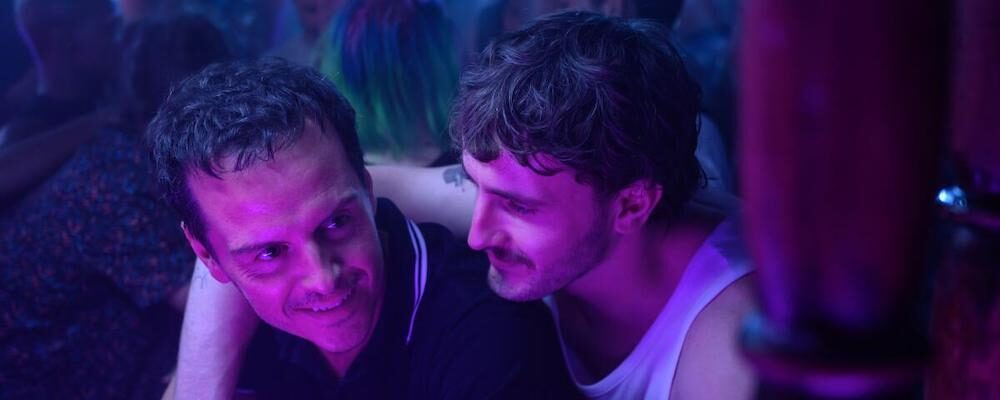Andrew Haigh’s ‘All of Us Strangers’ Is an Emotionally Mesmerizing Journey Where Love and Memories Collide
Alci Rengifo
Andrew Haigh’s “All of Us Strangers” is one of those films in an intriguing style that can be described as a psychological landscape defiant of expected plot beats. The experience is closer to listening to music. Yet, it’s also not some scattered arthouse experiment. Haigh adapts a novel by the late Japanese author Taichi Yamada into a hypnotic journey that touches on multiple, clear themes. Haigh richly creates a particular sense of disorientation, similar to when you’re dealing with a multitude of emotions and memories, clouded by constant musings on what could have been. Plainly put, it’s about loneliness and the yearning to feel something through another person. On that level, it could be called a love story, except affection here is an escape from a pained soul.
Adam (Andrew Scott) is a gay screenwriter that seems to be in his 40s, living high above in a London apartment building where sunsets give his space an otherworldly glow. He’s trying to get work done on a screenplay set in 1987, but finds himself wandering around the quiet, rather empty premises. Soon enough, he catches the eye of a slightly younger tenant, Harry (Paul Mescal), who shows up at his door, playfully suggesting they hook up. Adam kindly turns down the offer but later invites Harry in. But as they do start engaging in a romantic bond, Adam takes the tube to the suburbs where he grew up. When he visits his childhood home, time seems to bend on itself and he sees his parents (Claire Foy and Jamie Bell). But they died in a car crash when Adam was 12. It was this tragedy that shaped Adam into a rather solitary man, feeling desires but holding back. He also never had the opportunity to tell his parents he is gay.
Haigh is a director fascinated by relationships and their fragility. His films like “45 Years” and “Weekend” explore how marriages can collapse or the way one night stands might turn into deeper links between some people. “All of Us Strangers” invites us to see everything through the eye of Adam’s emotional state. The photography by Jamie Ramsay has a dreamlike tone where places are familiar but hazy. It’s not a fantasy where by some magical trick the writer’s parents have returned from the dead. Adam, with his wordsmith’s imagination, is clearly conjuring scenarios triggered by visiting his old house. There is a special melancholy to the idea one can return to the past and ask what couldn’t be articulated before. Adam sits down with his mother and when she asks if he has a girlfriend, he tells her he’s gay. For what we can assume is a boomer, her reaction is unsurprisingly stunned. Her first worry is that Adam might be discriminated against in public. These are manifestations of how Adam expects his parents would have reacted had they still been around to have this chat with his adult self.
Andrew Scott and Paul Mescal have the right combination of older reservation and younger liveliness to make this couple very engaging on an emotional level. Theirs is not a jaded coming together but an organic relationship that helps Adam open up. After sex he might share something no one else can pry out. Had Harry never appeared, Adam would spend more endless days staring out his apartment window. But he comes with baggage and the younger man soon realizes his lover is seeing things, not in the sense of a breakdown, but clearly processing a trauma. There’s genuine tenderness when they go to a gay club and move to Blur’s “Death of a Party” or hold each other to “The Power of Love” by Frankie Goes to Hollywood. For Adam this isn’t the full answer to his scars, but it’s sometimes better to not walk a wrenching personal journey completely alone.
“All of Us Strangers” is about the character’s growth and not shocking revelations. Haigh’s screenplay captures those memories where one moment or phrase means everything. Adam sits down with his dad, who is clearly unsettled by learning his son is gay but is too nice to lash out. What they exchange in their dialogue has more genuine heartbreak than any rom-com. In another scene, both parents and Adam talk things through the way adults should. What gives such a moment an even more shattering force is that we know it never took place, Adam can only imagine it. The film’s ending is what plays too much like a “twist,” but we can forgive it when it transitions to a final shot of pure melancholia. There is so much we could go back and say to someone long gone if we could. A gift and curse of our memories is that we can only travel back to a moment in time through our minds, before coming back to reality.
“All of Us Strangers” releases Dec. 22 in select theaters.

